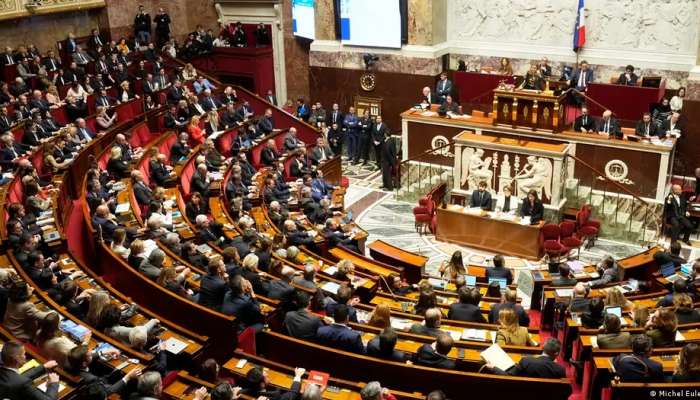
Paris: It's been over a year since the French president, Emmanuel Macron, pledged that his government would aim to implement a "balanced" reform to immigration laws. The aim was to have a law that would prevent irregular migration and facilitate the deportation of asylum seekers whose claims had been rejected, but that would also encourage the integration of working migrants.
However, in the parliamentary elections in the summer of 2022, Macron's governing coalition lost its absolute majority in France's National Assembly. The second parliamentary chamber is already dominated by the center-right Republicans (Les Républicains), who have shifted further rightward in recent years, under pressure from Marine Le Pen's far-right National Rally.
The Senate had already removed a central point of the reform early on in the proceedings. Migrants will not be granted permanent residency in France, even if they find jobs in industries with a shortage of workers. The government then had to make further difficult concessions in the joint committee consisting of seven senators and seven deputies. The new immigration law will put France on the same anti-migration course that has recently been adopted by other states, notably the Nordic countries.
The government has made significant concessions to the conservative opposition parties, especially on residence permits and access to social benefits. People without employment will have to wait five years before they become eligible for child benefit, the enforceable right to housing, or personal support for freelancers. For immigrants with jobs, the waiting period will be two-and-a-half years.
Access to housing benefits was a particular bone of contention between the governing parties and the Republicans. Foreigners from outside the EU will now only be eligible for housing benefits when they have been resident in France for five years. However, those who have a job, are studying, or who are recognised asylum seekers will receive this support after three months' residency.
Migrants without residence permits — so-called sans papiers — are often the subject of heated debate in France. The rules are being tightened for them as well. State representatives in the French regions (prefects) will in future have the authority to grant residence permits to these individuals, if they are working in occupations where there is a labour shortage, have been living in France for at least three years, and have been employed for at least the past 12 months. However, the residence permits will only be valid for one year.
One concession from the opposition to the government is that employees will be able to apply for this residence permit without having to obtain their employer's consent. The "sans-papiers reform" is initially being classified as an experiment, applicable only until 2026.
Being in France irregularly will once again become a criminal offense, punishable by one year in prison and a fine of €3,750 ($4,105). The Republicans' party leader, Eric Ciotti, received assurances from the interior minister, Gerald Darmanin, that he would expedite the construction of deportation centers. Eleven new "administrative reception centres" are due to open in France by 2027.
A Black man being manhandled by two French policemen in black body armorA Black man being manhandled by two French policemen in black body armor
Although the government considers it unconstitutional for parliament to impose quotas on immigration, the compromise law does include such a regulation, for the next three years. The cap will apply to non-EU foreigners — with an exemption for asylum seekers. Many politicians in both the presidential camp and the left-wing opposition hope that the Constitutional Council will overturn this regulation upon review.
In the Senate on Tuesday evening, Interior Minister Darmanin, who himself was previously a member of the Republicans, described some parts of the law as unconstitutional. President Macron also seems to have doubts. Prime Minister Elisabeth Borne said in a radio interview: "The president will appeal to the Constitutional Council, and the Constitutional Council will determine where things stand."
Three black-clad security guards stand in front of a clear protective screen shielding an old stone building with 'Constitutional Court' written on it in French.
Foreign citizens born in France will no longer automatically receive French citizenship when they reach adulthood. They will have to apply for it between the ages of 16 and 18. Anyone convicted of a crime will no longer be naturalised.
Dual citizens can have their French citizenship revoked if they are convicted of the deliberate homicide of a public official. This regulation is intended to protect state employees such as police officers, firefighters, and teachers.
Additionally, the lawmakers have resolved on stricter rules for family reunification, and decreed that students will have to pay a deposit to cover the costs of potential deportation. Access to health insurance is also being made more difficult for foreigners.
Marine Le Pen, the National Rally (RN) leader, described the compromise as an "ideological victory" for her party, and immediately announced that her parliamentary group approved it. "'National priority status — that is, preference given to French people over foreigners for certain social benefits — is now finally law," said Le Pen, whose party currently leads in the polls. All 88 RN deputies voted for the new law in the French National Assembly on Tuesday night, as did the Republicans' 62 deputies.
The presidential camp would not have had a majority without the right-wingers' support. 27 deputies from the governing parties voted against the tougher immigration laws, while 32 abstained. After the vote, the health minister, Aurelien Rousseau, resigned in protest. The consequences of tensions in the government camp will likely become apparent over the coming days.
On the other side of the political spectrum, the left-wing opposition accused the government of a "total loss of dignity" if it passed the law with the support of the Republicans and the National Rally. Migrants and refugees, who see the reform as introducing new and harsher measures, had protested against the plans.